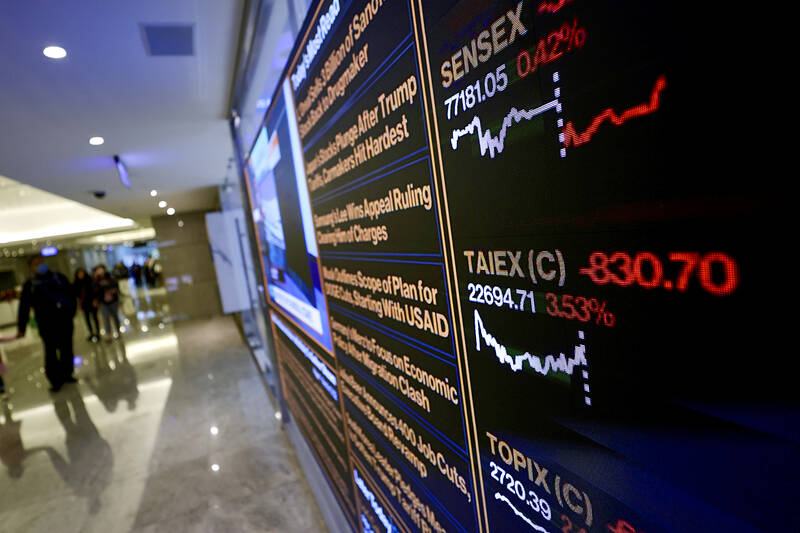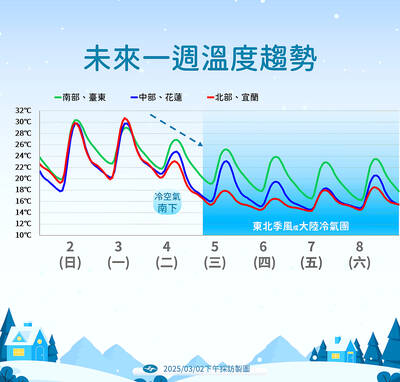The TAIEX yesterday plunged 3.53 percent, or 830.7 points, to close at 22,694.71, as major tech companies took a hard hit from Washington’s tariffs on imports from Canada, Mexico and China, where Taiwanese electronics suppliers have set up factories to take advantage of favorable tax terms.
The recent emergence of a Chinese artificial intelligence (AI) model DeepSeek (深度求索) contributed to the panic sell-off that scourged US tech shares, especially Nvidia Corp, during the Lunar New Year holiday.
“The TAIEX’s poor showing had much to do with Wall Street’s recent performance,” Taiwan Stock Exchange (TWSE) chairman Sherman Lin (林修銘) said at a public function in Taipei.

Photo: Ritchie B. Tongo, EPA-EFE
While DeepSeek raised new uncertainties, US tech giants Meta Platforms Inc and Google’s parent, Alphabet Inc, have reaffirmed their commitment to AI investments, a trend that should continue to benefit local firms in the supply chain, Lin said.
DeepSeek has sparked discussions on AI training methodologies rather than reversing AI development and applications, he said.
Shares of Taiwan Semiconductor Manufacturing Co (TSMC, 台積電), the world’s largest advanced-chip contract maker, shed 5.73 percent to NT$1,070, while AI server maker Quanta Computer Inc (廣達) fell by the daily limit to NT$243, TWSE data showed.
The revenue of Taiwan’s listed firms totaled NT$43 trillion (US$1.3 trillion) last year.
Among this, exports from Taiwan to the US via China accounted for only 5 percent, and exports destined to the US via Canada and Mexico made up a tiny 1 percent, Lin said, seeking to calm market jitters.
Turnover was NT$492.831 billion, with foreign institutional players selling a net NT$74.4 billion, the fourth-largest on record, and proprietary traders cutting stakes by a net NT$20.4 billion of shares, TWSE statistics showed.
Trump has also threatened to slap tariffs on semiconductor imports to encourage chipmakers to set up manufacturing in the US.
Lin said that many Taiwanese firms are agile and resilient, with TSMC already setting up fabs in the US, Japan and Germany.
Other tech companies with operations in Mexico would start to shift production to the US, Lin said.
Japan’s Nikkei 225 ended the day down 2.66 percent and Australia’s S&P/ASX 200 dropped 1.79 percent. Hong Kong’s Hang Seng index finished flat after reopening from the Lunar New Year holiday. Mainland Chinese markets resume trading tomorrow.
Additional reporting by Reuters

SECURITY: The purpose for giving Hong Kong and Macau residents more lenient paths to permanent residency no longer applies due to China’s policies, a source said The government is considering removing an optional path to citizenship for residents from Hong Kong and Macau, and lengthening the terms for permanent residence eligibility, a source said yesterday. In a bid to prevent the Chinese Communist Party (CCP) from infiltrating Taiwan through immigration from Hong Kong and Macau, the government could amend immigration laws for residents of the territories who currently receive preferential treatment, an official familiar with the matter speaking on condition of anonymity said. The move was part of “national security-related legislative reform,” they added. Under the amendments, arrivals from the Chinese territories would have to reside in Taiwan for

CRITICAL MOVE: TSMC’s plan to invest another US$100 billion in US chipmaking would boost Taiwan’s competitive edge in the global market, the premier said The government would ensure that the most advanced chipmaking technology stays in Taiwan while assisting Taiwan Semiconductor Manufacturing Co (TSMC, 台積電) in investing overseas, the Presidential Office said yesterday. The statement follows a joint announcement by the world’s largest contract chipmaker and US President Donald Trump on Monday that TSMC would invest an additional US$100 billion over the next four years to expand its semiconductor manufacturing operations in the US, which would include construction of three new chip fabrication plants, two advanced packaging facilities, and a research and development center. The government knew about the deal in advance and would assist, Presidential

‘DANGEROUS GAME’: Legislative Yuan budget cuts have already become a point of discussion for Democrats and Republicans in Washington, Elbridge Colby said Taiwan’s fall to China “would be a disaster for American interests” and Taipei must raise defense spending to deter Beijing, US President Donald Trump’s pick to lead Pentagon policy, Elbridge Colby, said on Tuesday during his US Senate confirmation hearing. The nominee for US undersecretary of defense for policy told the Armed Services Committee that Washington needs to motivate Taiwan to avoid a conflict with China and that he is “profoundly disturbed” about its perceived reluctance to raise defense spending closer to 10 percent of GDP. Colby, a China hawk who also served in the Pentagon in Trump’s first team,

The arrival of a cold front tomorrow could plunge temperatures into the mid-teens, the Central Weather Administration (CWA) said. Temperatures yesterday rose to 28°C to 30°C in northern and eastern Taiwan, and 32°C to 33°C in central and southern Taiwan, CWA data showed. Similar but mostly cloudy weather is expected today, the CWA said. However, the arrival of a cold air mass tomorrow would cause a rapid drop in temperatures to 15°C cooler than the previous day’s highs. The cold front, which is expected to last through the weekend, would bring steady rainfall tomorrow, along with multiple waves of showers